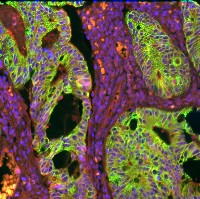A team of scientists at GE Global Research, the technology development arm of the manufacturing and finance company GE, has begun a study with Memorial Sloan-Kettering Cancer Center (MSKCC) in New York, N.Y., to better understand the early stages of colon cancer. The goal is to yield new insights that improve treatment selection and outcomes for cancer patients in the future.
GE notes that the standard treatment for early stage, or Stage 1 and Stage 2 colon cancer is surgery. However, the cancer recurrence rate for Stage 2 cases is high — about 25 percent — because more aggressive forms of these cases go undetected.
The problem suggests that one of the primary issues in cancer diagnosis is the limited amount of molecular information pathologists have about a particular cancer. At the time of diagnosis, little is determined about the characteristics of cancer itself such as how fast or slow it may be growing. New breakthroughs in molecular medicine, says GE, are promising to change this paradigm.
In its announcement of the collaboration, GE points to new molecular pathology technology it developed that can create a visual map of more than 25 proteins within a single tissue sample at the sub-cellular level and apply imaging analysis tools to collect and interpret the data. With the ability to study multiple proteins in one sample, GE says its technology could provide more insights into the signaling networks and cell activity that characterize different types of cancers.
As part of the study, GE and MSKCC will collaborate to evaluate biomarkers for their prognostic value to segregate high from low risk early stage colon cancers. The team will first identify cancer cases, acquire and process cancer tissues, and collect treatment outcome information. The scientists then will biochemically and statistically analyze the molecular profiles for the cancer tissues, and relate the molecular profiles to treatment outcomes.


 RSS - Posts
RSS - Posts
You must be logged in to post a comment.